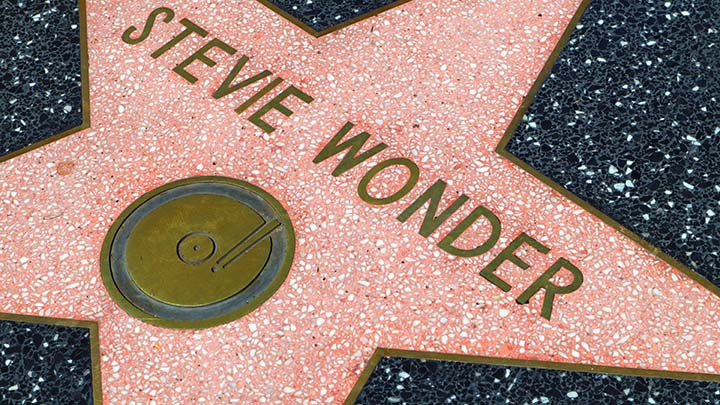Music class explores a six-decade ‘genius’
A new course on Stevie Wonder will delve into the artist’s multiple award-winning works and the cultural context in which they came to be.

Updated Aug. 14, 2024
In music theory, San Diego State University lecturer Gary Recker says, the word “transcendence” is often used to refer to an experience “where music just lifts us up and out of ourselves to this kind of higher experience…something that doesn't occur naturally.”
And to Recker, few figures embody this accomplishment better than Stevie Wonder, the singer-songwriter and winner of 25 Grammys who has been performing for more than 60 years, and is the focus of a new SDSU class for fall 2024 (MUS 351: Music and Culture).
“He has created a huge catalog of moments that do that,” said Recker, who received a master’s degree in musicology with a thesis on Stevie Wonder’s use of keyboards. Recker, who began teaching at SDSU after retiring from a career in the world of finance, developed the course idea.
Stevie Wonder “is masterful at conveying emotion through his music, at being very creative and inspired in his music,” he said. “He’s a gem that I just hope most people have a chance to experience on a slightly deeper level than they might otherwise.”
In a recording career that began at age 11, Stevie Wonder’s greatest hits include “You are the Sunshine of My Life,” “I Was Made to Love Her,” and “For Once in My Life.”
It was “Superstition” (“Very superstitious, writing’s on the wall”), a track from the 1972 album “Talking Book,” that hooked Recker, growing up in San Diego’s Valencia Park neighborhood. Recker would raid his older brother’s supply of vinyl, “and I wore that album out,” he said. “That was where it started for me.”
Today Recker regards Stevie Wonder as a “genius” composer who creates “harmonies to go under the music that’s unusual but pleasant. He finds a way to pull you in a song that’s got incredible depth of musical creativity in it.”
His voice, especially on ballads, is “crystal clean and very persuasive,” and “as an instrumentalist he’s incredible.” On “Superstition,” Stevie Wonder played every instrument except the horns, all self-taught.
“He’s able to take incredibly complicated ideas and make them sound good,” said Recker. “He loves music, and music loves him.”
The class, scheduled to meet at 11 a.m. Monday and Wednesdays, is meant to explore not just the music of Stevie Wonder but the social, cultural and historical context in which it occurred. The class requires a minimum enrollment that hasn’t quite been achieved yet; Recker is hoping publicity through social media ― and this article ― will help fill the room. (Update: The minimum enrollment requirement has been achieved and the class will meet for the first time Aug. 26.)
Nate Bomar, a computer science major, is among those already signed up and “super pumped” for the class.
“I'm just a really big appreciator of music in general,” Bomar wrote in response to an email request for a comment. “Stevie Wonder is just an absolute legend. ‘Songs in the Key of Life’ is one of the best albums I have ever listened to, and I'm just hoping to learn about the life and skill of the artist that made that album and so much more.”
For Catherine Curley, a journalism major, the class looked like a chance to have some fun with an area of education that already interested her. “Stevie Wonder expresses so much joy for life in his music,” she wrote.
“I like the idea of learning about the music in the context of its culture and vice versa,” Curley added. “I hope to be able to connect those dots better with a college-grade education on one of the most influential artists of the 20th century.”
The cultural context Recker speaks of is something he believes Stevie Wonder helped shape. He was among the most driving figures behind the creation of Martin Luther King Jr. Day, first observed in 1986.
“My hope is that people who are vaguely aware that he’s done some fun stuff are curious enough to take a look, with some depth, into this class,” Recker said. Even those whose tastes run more to Taylor Swift or Beyoncé may find that studying Stevie Wonder “broadens their appreciation of whatever music it is that they’re listening to.”



